What Aspects of Nonwhites Living Conditions Contribute to Their Poor Health Outcomes?
Coronavirus: Why some racial groups are more vulnerable
(Image credit:
Getty Images
)
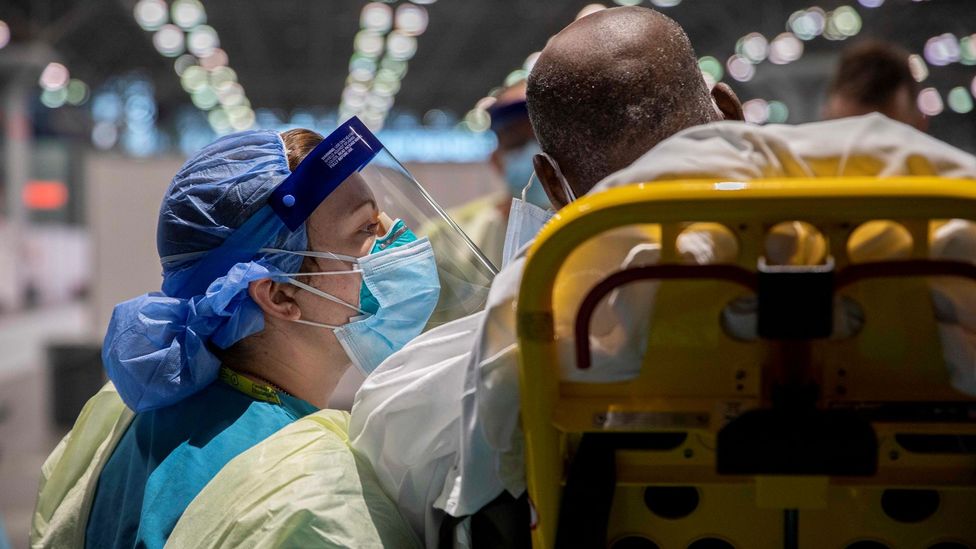
From bigotry to language, a variety of factors are affecting different groups' vulnerability to coronavirus — with sometimes devastating results.
E
Fifty-fifty with a virus that doesn't respect borders, vulnerability is spread unevenly. And some of the largest disparities seen then far take involved race and ethnicity.
Early data of the Covid-xix crisis, broken down by race, is alarming. In the US, in Chicago, as of early Apr 2020, 72% of people who died of coronavirus were black, although merely one-3rd of the metropolis's population is. In Georgia, every bit of 17 April, white people accounted for forty% of Covid-19 cases where race was reported, although they correspond 58% of the state. In the United kingdom, of the offset 2,249 patients with confirmed Covid-xix, 35% were non-white. This is much higher than the proportion of non-white people in England and Wales – 14%, according to the nigh recent demography.
You lot might besides like:
- Why Covid-xix is different for men and women
- What is Covid-19'south real death charge per unit?
- How the new coronavirus might change the globe
Given the long history of diff health outcomes, these patterns shouldn't exist surprising. The pandemic is the latest example of how racial dynamics play out in complex – and notwithstanding not entirely understood – means.
Income inequality
In many majority-white countries like the US (also as some minority-white countries like S Africa), people from other indigenous and racial groups take less access to economic resources – whether that ways high-earning jobs or a full pantry. That economic vulnerability often translates to poorer health outcomes.
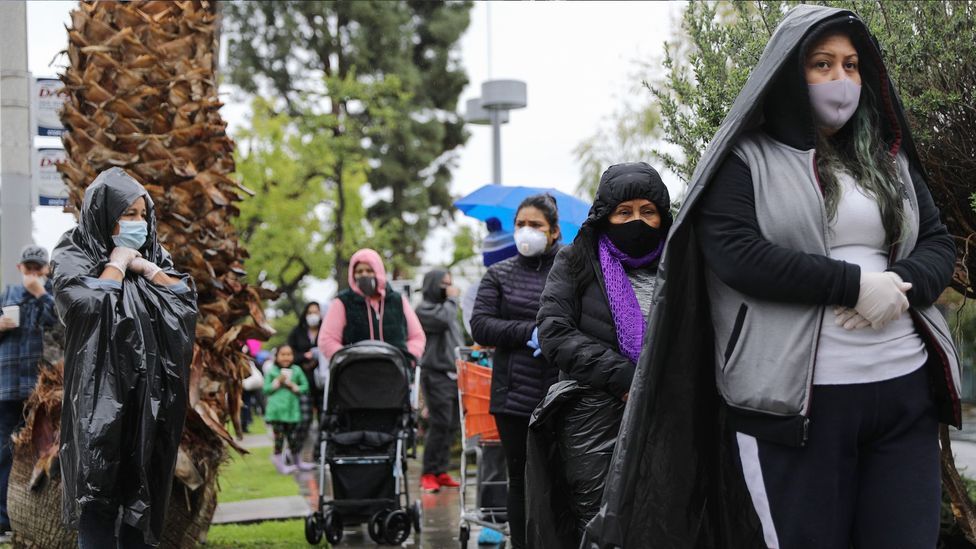
People expect in line at a food bank in Van Nuys, California, where organisers said they had distributed food for 1,500 families amid the spread of Covid-nineteen (Credit: Getty Images)
There are a number of consequences of lacking access to consistent nutrition, including college take chances of underlying health weather. In the US, for example, African Americans are more probable than white residents to have diabetes, centre disease and hypertension – which weaken lungs and immune systems. And people with pre-existing health weather are more likely to develop severe Covid-xix symptoms.
Of course, this doesn't just hateful sure groups are more vulnerable to Covid-19. Information technology also means they're more than vulnerable to its economic consequences. In South Africa, for example, development economist at the University of Witwatersrand Imraan Valodia has forecast that the lockdown will lead to a 45% loss of income for the poorest 10% of households, with especially harmful effects on informal workers without a condom internet. As a result, he is calling for an cease to the lockdown (i alternative could be a curfew).
"For the upper classes who tin continue to earn an income and who have wealth to fall back on, the lockdown is easy to manage. For the lower classes, this is non the case," Valodia says.
Other racial disparities
But economic inequality isn't the simply challenge disproportionately faced by BAME (Black, Asian and Minority Ethnic) groups.
Persistent environmental injustice, for case, means that unduly high numbers of ethnic-minority households in North America and Europe alive nearly incinerators and landfills, and schools with high proportions of minority students are located about highways and industrial sites – for both economical and non-economic reasons. This too affects vulnerability to lung-inflaming weather similar asthma and Covid-19. "Air quality, which early data is highlighting to be a potential hazard gene for Covid-xix, is also a adventure gene for respiratory health," says Grania Brigden, who leads the tuberculosis section at the lung wellness organisation The Union.

An army sergeant speaks to a patient at the Javits New York Medical Station, which supports local hospitals in New York City (Credit: Getty Images)
Then at that place is racism itself. Allostatic load (or "weathering") refers to the accumulated physiological burden from the stresses caused past racism and race-related disadvantage, such as the frequent secretion of stress hormones.
While weathering is more than severe for people with low socioeconomic status, studies suggest that it affects the wellness deterioration and mortality of higher-income African Americans (especially women) as well, including their newborns.
Even medical staff themselves may not be shielded from these effects: investigation is ongoing into why the kickoff 10 doctors in the UK reported to have died from Covid-19 were all BAME.
Occupational factors
Meanwhile, effectually the world, certain racial and ethnic groups are disproportionately represented in at-take chances professions. For case, 26.iv% of Transport for London staff are from BAME groups (vs. the 14% for all of England and Wales). People of colour are also essentially more than likely to be unemployed, underemployed or precariously employed, which makes them peculiarly likely to undertake hazardous temporary or gig economy work similar delivering food.
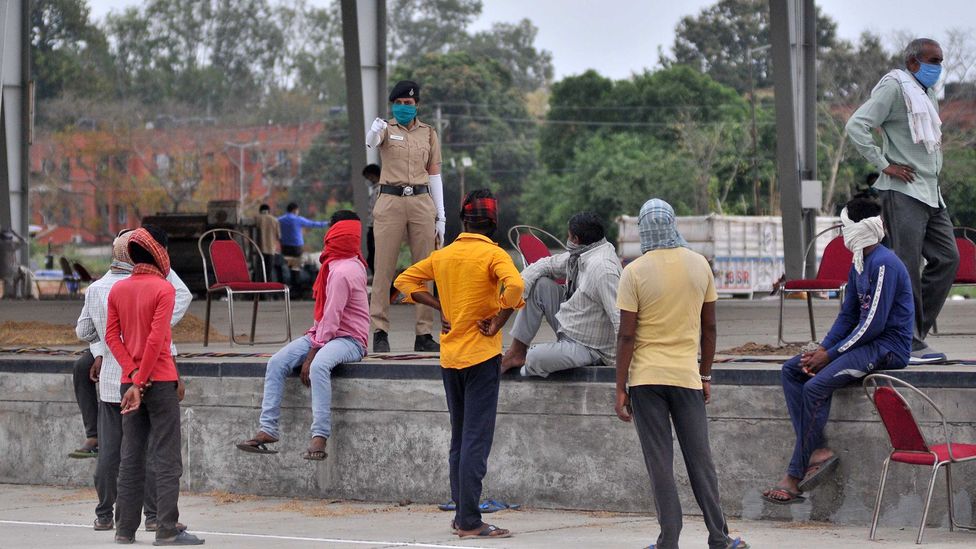
A police official warns labourers to wear face masks at the grain market place in Chandigarh, India (Credit: Getty Images)
In the United states, farmworkers are often undocumented migrants from Latin America with little control over safe working conditions. Information technology can be difficult to ensure physical distancing in the fields, isolation in the farmworker camps, or proximity to medical facilities. Farmworkers in the United states of america have high rates of diabetes and pesticide exposure, stressing their allowed systems and thus making them more vulnerable to infectious diseases. Wael Elamin, a medical microbiologist at King'southward College Infirmary in Dubai, points out that migrant workers also face overcrowded living conditions in a number of Centre Eastern countries that depend on their labour.
In full general, undocumented people are especially unlikely to seek formal medical care out of fear of being reported to law enforcement. This influenced Portugal'south conclusion to grant temporary residency rights to asylum seekers and other migrants whose residency applications were awaiting: minimising that fear would help public wellness. It's even so too early to know whether this determination has paid off, merely public health agencies accept praised the move.
Housing differences
Overcrowding also is likelier to affect lower-income groups across the globe, from Native American families to displaced Rohingyas. With a disease every bit infectious every bit Covid-nineteen, information technology's easy to see how that could translate to poorer outcomes.
In a Population Quango phone survey of five informal settlements in Nairobi, for instance, 85% of respondents reported that they had no place in their home to isolate an sick person, 82% would be unable to stay at dwelling house for xiv days (mainly due to the loss of income), and 37% would have difficulty washing their easily ofttimes due to a lack of water.
In the UK, meanwhile, one survey establish that 26% of Bangladeshi British households, and 21% of black African ones, have more people than bedrooms. The same is true of just ii% of white British households. Bangladeshi, Indian and Chinese households in the UK also accept higher rates of elderly people living with children – a articulate vector for passing on Covid-19 to the about vulnerable age group.
Precarious housing is another challenge, as people who are homeless or vulnerably housed are less able to observe social distancing and self-isolation. In the Britain, at least 31% of homeless households prioritised for assistance are non-white (although, as we've seen, non-whites make up simply fourteen% of the overall population of England and Wales). Demolitions of shack settlements have continued in Durban, Due south Africa despite the public wellness crunch. Nigerians are being targeted for eviction in Guangzhou, Cathay. And black women in Milwaukee and other US cities are much more than likely than white residents to hire their homes (and to exist evicted from them, although evictions have been suspended in Milwaukee County in response to the crisis).
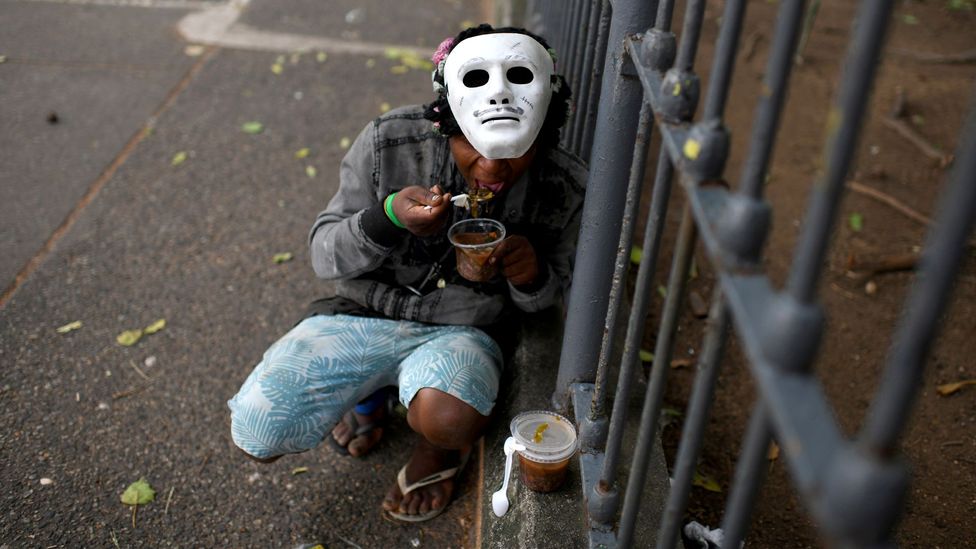
In Rio de Janeiro, a person who is homeless eats food provided by residents of the Chapeu Mangueira slum during the Covid-19 outbreak (Credit: Getty Images)
It's important to call up that residential segregation isn't simply a by-product of income inequality. It's also a event of systematic and widespread housing discrimination on the footing of race, caste and other identity-linked factors.
Cultural factors
At the aforementioned time, the crisis is amplifying misinformation and biases against specific groups.
It has additional Islamophobia in India, thanks in part to "corona jihad" rumours on social media about Muslims deliberately coughing and sneezing on others. The US has also seen rumours, particularly during the early part of the epidemic, near black people beingness somehow allowed to the virus – a myth that persists across Africa as well.
Biases also mean some are less likely to take preventative behaviour similar wearing masks. Black men in the U.s.a. have reported being uncomfortable wearing masks in public: racial bias and profiling means they're more probable to be seen every bit a criminal or unsafe, rather than as simply protecting their ain wellness.
Then there is the impact on Asians and Asian Americans.
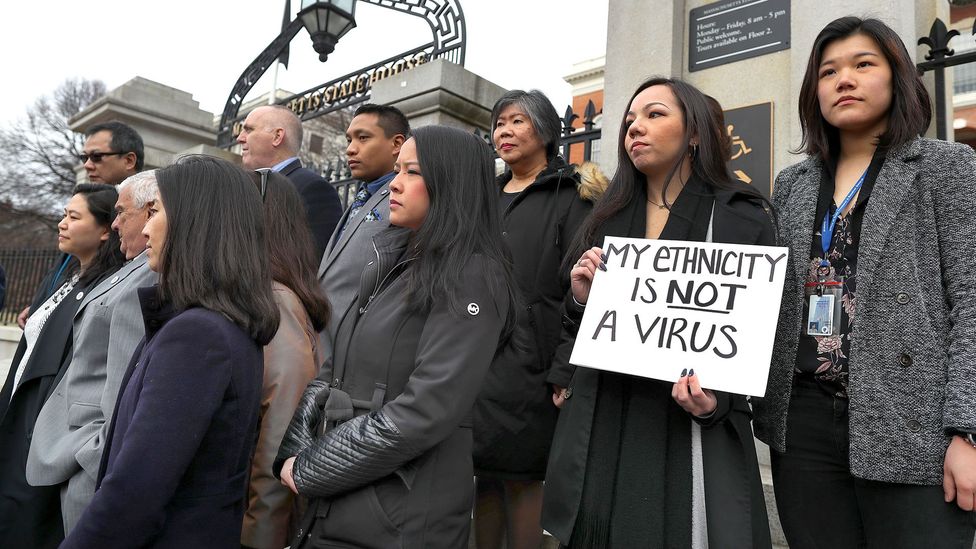
Members of the Asian American Commission hold a press briefing condemning racism towards the Asian American community during the Covid-19 crunch (Credit: Getty Images)
Cynthia Choi is one of the executive directors of Chinese for Affirmative Activity. This arrangement, along with the Asian Pacific Policy and Planning Council, launched the Finish AAPI Hate website on 19 March 2020. The site collects reports of harassment and set on of Asians and Pacific Islanders in the US, including incidents of Asian Americans being physically assaulted and coughed and spat on. Most of the people targeted in these incidents have been women.
"AAPIs are becoming increasingly fearful of existence harassed or attacked going to work, walking in their neighbourhoods and going to public places," Choi says, based on the incident descriptions received by End AAPI Hate.
Language barriers
Fifty-fifty language has had a marginalising effect on some groups effectually the world.
Much of the initial public health guidance around Covid-xix has been in dominant languages, points out Salman Waqar, an academic GP registrar at the Academy of Oxford and the general secretary of the British Islamic Medical Association. "There needed to be a improve understanding at the beginning of this pandemic that these messages may non necessarily get through to the grassroots," he says.
Indeed, terms similar "social distancing" and messages virtually safety measures have been hard to translate into a number of languages.
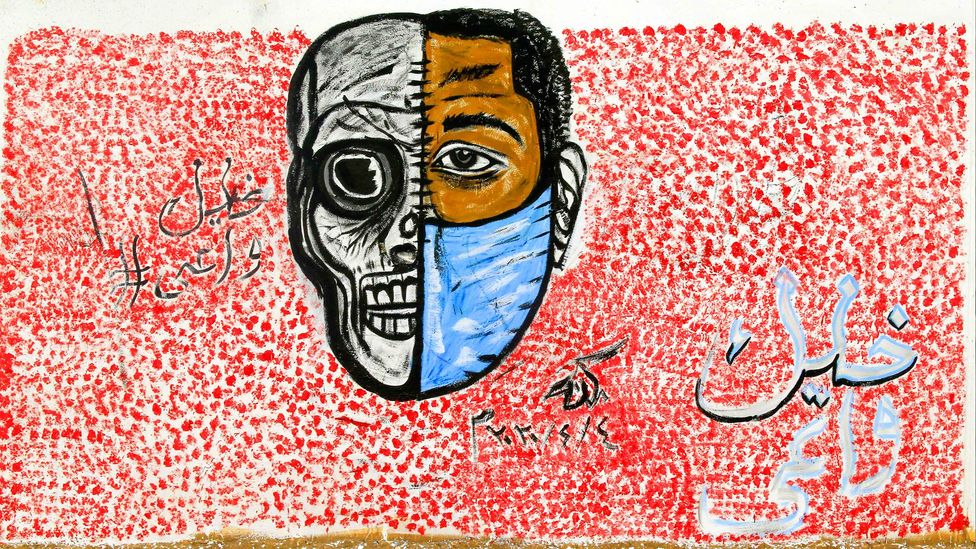
Urban art depicting the importance of face masks, part of a Covid-19 campaign, is pictured with the Arabic hashtag 'Stay aware' in Khartoum (Credit: Getty Images)
You only need to await at the Ebola outbreak that started in the Democratic Republic of Congo in 2018 to see what effect this tin take, notes Ellie Kemp, head of crisis response for Translators without Borders. For instance, official communications from the Ministry of Health and the World Health Organization likely started out in either English or French, then were translated into a not-local version of Swahili, with key terms similar "swab" remaining in French.
"1 of the cyberspace results of the confusion that caused was that people didn't really trust the information," Kemp says. Women and less educated people, particularly, "didn't sympathize the language used past the doctors and the medical staff. And and then they didn't feel they were able to make themselves understood." Many chose not to seek medical care, or were misdiagnosed.
"There's this terrible coincidence between people who are likely to take less health literacy to get-go with, and people who are less likely to speak an international language," Kemp says.
She remembers widespread puzzlement nigh the term "contact tracing". People didn't know what a "contact" meant – was it someone in your telephone book? Sexual contact?
The phrase was ultimately translated into a Swahili version of "monitoring people who've been close to a sick person" – a term that was easier to empathize.
Narrowing the gaps
Experts say that addressing these disparities in the short term will crave steps that will help everyone, but especially people of color: getting protective equipment to all essential workers, including janitors and sanitation workers; increasing access to medical care, whether in private or public facilities; providing secure housing for people who fall sick; increasing fiscal support to both individuals and nonprofit organisations; and ensuring the basics, like handwashing stands and soap, in the areas with the fewest resources, including informal settlements and refugee camps.
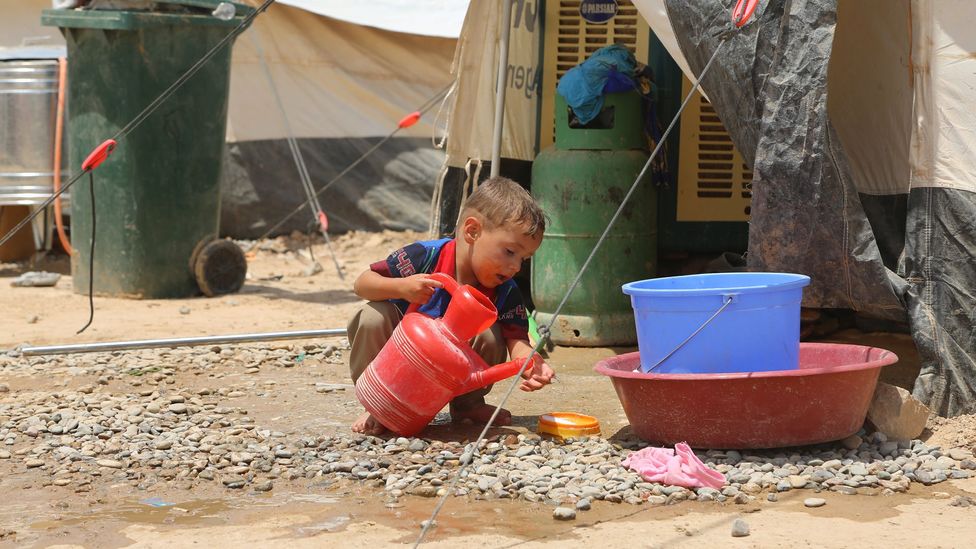
A male child washes at the Dibege Refugee Army camp in Iraq; ensuring that in that location are handwashing stands and soap is key to fighting Covid-19's spread in refugee camps (Credit: Getty Images)
Getting vitamin D supplements to vulnerable groups, including darker-skinned people, could assist with immune response in general (although there isn't a consensus nearly how widespread vitamin D supplementation should be, and in which amounts).
There's also an urgent need for more data, broken down past demographic groups, to know how to best serve different communities. Just this has been stymied past political obstacles in some countries, and insufficient resources in others. As of fourteen April 2020, only 22% of Covid-19 cases reported in the US specified the race of the patient. And microbiologist Elamin points out that in Sudan, it's challenging to collect medical data on whether, for instance, respiratory illnesses recorded in December 2019 and January 2020 could accept been cases of Covid-19. Gathering more specific demographic information on population groups most afflicted would be fifty-fifty tougher and more sensitive.
Attention to the medium and longer term will also be needed. The pandemic highlights and exacerbates health inequities, but information technology doesn't create them. Nor volition the disparities terminate with the emergency.
As a result, say experts, policy discussions effectually social protection and universal healthcare are more of import now than ever. According to lung health expert Brigden, the pandemic "has highlighted, even in higher-income countries, the importance of a strong and well-funded health system that is available to all".
The earth also needs an acceleration of environmental regulations that reduce air pollution (which particularly weakens respiratory wellness among marginalised communities); the Us is currently seeing a rollback, instead.
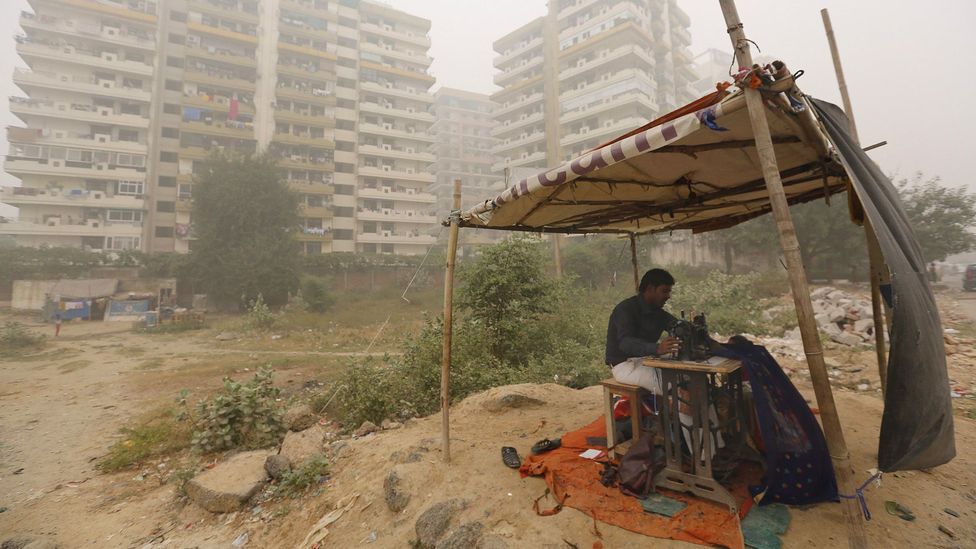
A roadside tailor stitches cloths in heavy smog in New Delhi, India; air pollution is linked to weakened respiratory wellness (Credit: Getty Images)
And there needs to be a careful expect at how economic fallout volition disproportionately touch on BAME communities. For example, subsequently the 2007-08 fiscal crisis, ethnic minorities in the United kingdom of great britain and northern ireland faced higher unemployment, lower earnings and higher housing costs.
"What's going to kill u.s.a. more: the bug, or the poverty that'south associated with the issues?" asks microbiologist Elamin.
For now, information technology's incommunicable to answer. Only what is clear regarding coronavirus is that, as he says, "the manner it spreads is not equal".
But there is a best-case scenario. And that is that the current pandemic volition galvanise more than, and longer-lasting, attending to the social, political and economic structures that shape how dissimilar people experience the pandemic – and spur activeness so that, in the future, a gene like an individual's race or ethnicity will have less touch on the gamble to their lives.
As an award-winning science site, BBC Time to come is committed to bringing you evidence-based assay and myth-busting stories around the new coronavirus. You tin can read more of our Covid-19 coverage here .
--
Join one million Futurity fans past liking united states of america on Facebook , or follow us on Twitter or Instagram .
If you liked this story, sign up for the weekly bbc.com features newsletter , called "The Essential List". A handpicked selection of stories from BBC Future, Culture, Worklife, and Travel, delivered to your inbox every Friday.
Source: https://www.bbc.com/future/article/20200420-coronavirus-why-some-racial-groups-are-more-vulnerable
0 Response to "What Aspects of Nonwhites Living Conditions Contribute to Their Poor Health Outcomes?"
Post a Comment